Terri Sewell votes in favor of public safety legislation

Congresswoman Terri Sewell voted in favor of four major public safety bills on Thursday. The Democratic bill’s sponsors hope they will deliver new federal resources to break the cycle of violence and build safer communities. This package of four bills passed the House of Representatives on Thursday. “Making our communities safer for our children and families has always been a top priority of mine in Congress, and that’s exactly what this legislation would do,” said Rep. Sewell. “Together, these bills would ensure that our local community organizations, local law enforcement, and especially rural police departments have the tools they need to keep Alabamians safe. With House passage of these bills, we’re one step closer to delivering deeply needed investments to prevent crime, boost community violence prevention, strengthen police accountability, and save lives.” The Invest to Protect Act was sponsored by Rep. Josh Gottheimer (D-New Jersey) and passed with a 360 to 64 vote. Nine Democrats and 55 Republicans voted against the bill. The legislation would allocate federal grants to small law enforcement agencies that encompass fewer than 125 officers. The Break the Cycle of Violence Act was sponsored by Rep. Steven Horsford (D-Nevada). It passed 220 to 207. Only one Republican, Rep. Brian Fitzpatrick (Pennsylvania), voted in favor. The legislation awards grants for coordinated community violence initiatives in areas that see a disproportionate amount of homicides and other forms of violence. The grants, from the Department of Health and Human Services, would be used to curb violent behavior. The Mental Health Justice Act was sponsored by Rep. Katie Porter (D-California). It awards funds to train and assign mental health professionals to respond to situations involving individuals with special behavioral needs, rather than sending law enforcement personnel. The measure passed 223 to 206, with three Republicans voting in favor. The VICTIM Act was sponsored by Rep. Val Demings (D-Florida). It creates a grant program that would give law enforcement agencies new funding to hire and train detectives to investigate homicides, sexual assaults, and other violent crimes. It also ensures that victim services are funded, staffed, and trained to address the needs of survivors and family members and provides federal funding to acquire and upgrade investigative technology to better process evidence. The bill passed in a 250 to 178 vote, with 30 Republicans joining all Democrats present in supporting the legislation. Sewell said that this legislation builds on President Joe Biden and Congressional Democrats’ ongoing work to build safer communities in Alabama and across the country. Sewell is in her sixth term representing Alabama’s Seventh Congressional District. To connect with the author of this story, or to comment, email brandonmreporter@gmail.com.
House passes same-sex marriage bill in retort to high court

The U.S. House overwhelmingly approved legislation Tuesday to protect same-sex and interracial marriages amid concerns that the Supreme Court ruling overturning Roe v. Wade abortion access could jeopardize other rights criticized by many conservatives. In a robust but lopsided debate, Democrats argued intensely and often personally in favor of enshrining marriage equality in federal law, while Republicans steered clear of openly rejecting gay marriage. Instead, leading Republicans portrayed the bill as unnecessary amid other issues facing the nation. Tuesday’s election-year roll call, 267-157, was partly political strategy, forcing all House members, Republicans, and Democrats, to go on the record. It also reflected the legislative branch pushing back against an aggressive court that has raised questions about revisiting other apparently settled U.S. laws. Wary of political fallout, GOP leaders did not press their members to hold the party line against the bill, aides said. In all, 47 Republicans joined all Democrats in voting for passage. “For me, this is personal,” said Rep. Mondaire Jones, D-N.Y., who said he was among the openly gay members of the House. “Imagine telling the next generation of Americans, my generation, we no longer have the right to marry who we love,” he said. “Congress can’t allow that to happen.” While the Respect for Marriage Act easily passed the House with a Democratic majority, it is likely to stall in the evenly split Senate, where most Republicans would probably join a filibuster to block it. It’s one of several bills, including those enshrining abortion access, that Democrats are proposing to confront the court’s conservative majority. Another bill guaranteeing access to contraceptive services is set for a vote later this week. House GOP leaders split over the issue, with Minority Leader Kevin McCarthy and Whip Rep. Steve Scalise voting against the marriage rights bill, but the No. 3 Republican Rep. Elise Stefanik of New York voting in favor. In a notable silence, Senate Republican leader Mitch McConnell declined to express his view on the bill, leaving an open question over how strongly his party would fight it if it should come up for a vote in the upper chamber. Key Republicans in the House have shifted in recent years on the same-sex marriage issue, including Rep. Liz Cheney of Wyoming, who joined those voting in favor on Tuesday. Said another Republican, Rep. Nancy Mace of South Carolina, in a statement about her yes vote: “If gay couples want to be as happily or miserably married as straight couples, more power to them.” Polling shows a majority of Americans favor preserving rights to marry, regardless of sex, gender, race, or ethnicity, a long-building shift in modern mores toward inclusion. A Gallup poll in June showed broad and increasing support for same-sex marriage, with 70% of U.S. adults saying they think such unions should be recognized by law as valid. The poll showed majority support among both Democrats (83%) and Republicans (55%). Approval of interracial marriage in the U.S. hit a six-decade high at 94% in September, according to Gallup. Ahead of Tuesday’s voting, a number of lawmakers joined protesters demonstrating against the abortion ruling outside the Supreme Court, which sits across from the Capitol and remains fenced off for security during tumultuous political times. Capitol Police said among those arrested were 16 members of Congress. “The extremist right-wing majority on the Supreme Court has put our country down a perilous path,” said Rep. Mary Gay Scanlon, D-Pa., in a floor speech setting Tuesday’s debate in motion. “It’s time for our colleagues across the aisle to stand up and be counted. Will they vote to protect these fundamental freedoms? Or will they vote to let states take those freedoms away?” But Republicans insisted the court was only focused on abortion access in June when it struck down the nearly 50-year-old Roe v. Wade ruling, and they argued that same-sex marriage and other rights were not threatened. In fact, almost none of the Republicans who rose to speak during the debate directly broached the subject of same-sex or interracial marriage. “We are here for a political charade; we are here for political messaging,” said Rep. Jim Jordan of Ohio, the top Republican on the Judiciary Committee. That same tack could be expected in the Senate. Sen. Josh Hawley, R-Mo., said, “The predicate of this is just wrong. I don’t think the Supreme Court is going to overturn any of that stuff.” As several Democrats spoke of inequalities they said they or their loved ones had faced in same-sex marriages, the Republicans talked about rising gas prices, inflation, and crime, including recent threats to justices in connection with the abortion ruling. For Republicans in Congress, the Trump-era confirmation of conservative justices to the Supreme Court has fulfilled a long-term GOP goal of revisiting many social, environmental, and regulatory issues the party has been unable to tackle on its own by passing bills that could be signed into law. The Respect for Marriage Act would repeal a law from the Clinton era that defines marriage as a heterogeneous relationship between a man and a woman. It would also provide legal protections for interracial marriages by prohibiting any state from denying out-of-state marriage licenses and benefits on the basis of sex, race, ethnicity, or national origin. The 1996 law, the Defense of Marriage Act, had basically been sidelined by Obama-era court rulings, including Obergefell v. Hodges, which established the rights of same-sex couples to marry nationwide, a landmark case for gay rights. But last month, writing for the majority in overturning Roe v. Wade, Justice Samuel Alito argued for a more narrow interpretation of the rights guaranteed to Americans, noting that the right to an abortion was not spelled out in the Constitution. In a concurring opinion, Justice Clarence Thomas went further, saying other rulings similar to Roe, including those around same-sex marriage and the right for couples to use contraception, should be reconsidered. While Alito insisted in the majority opinion that “this decision concerns the constitutional right to abortion and no other right,” others have taken notice. “The MAGA
Jerry Carl supports bill to allow flexibility in spending COVID-19 funds
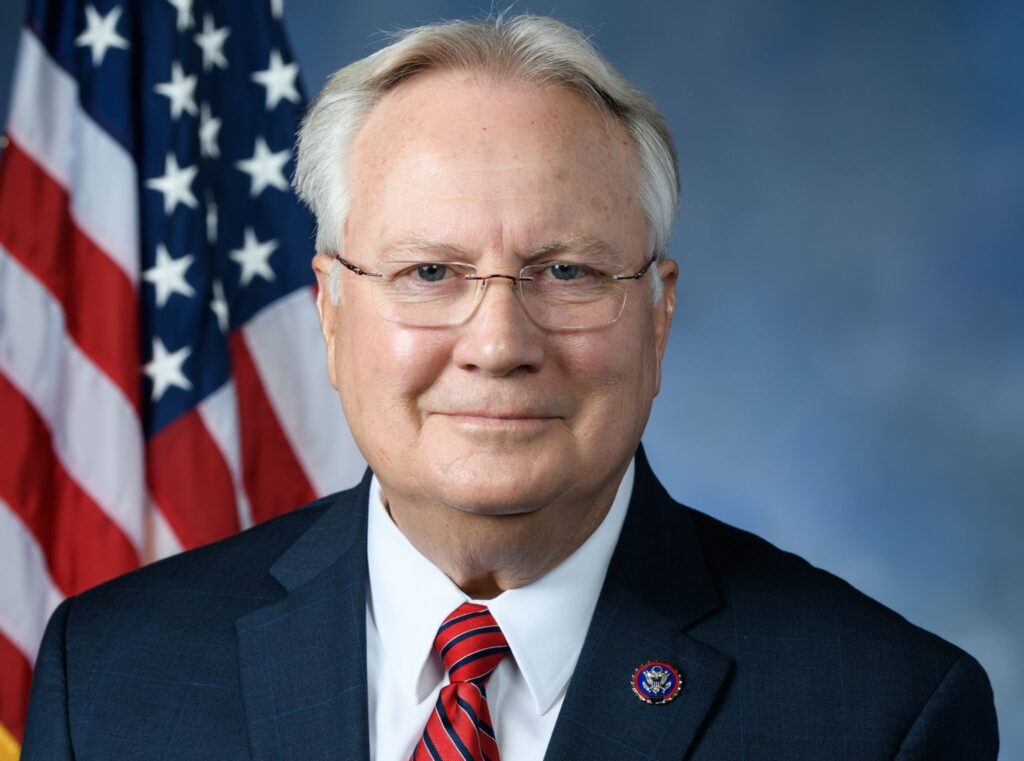
Congressman Jerry Carl announced he has co-sponsored a bipartisan bill to give state and local officials flexibility and time to spend the remainder of COVID-19 relief dollars. The State, Local, Tribal, and Territorial Fiscal Recovery, Infrastructure, and Disaster Relief Flexibility Act, introduced by Reps. Dusty Johnson and Carolyn Bourdeaux, aims to make various infrastructure investments eligible for payment with these funds. The legislation recently passed the U.S. Senate unanimously. Under the CARES Act, Congress did provide some flexibility for how COVID-19 funds could be spent, but the funds were not able to be used for infrastructure projects. This bill will give state and local officials additional flexibility and time to spend the remaining COVID-19 relief dollars responsibly. Carl supports the effort to add infrastructure spending as part of the COVID funding. Carl said in a statement, “South Alabama has a desperate need for investments in true infrastructure such as roads, bridges, ports, waterways, and broadband. As a former county commissioner, investing in our nation’s infrastructure is a top priority for me, so I’m proud to cosponsor this bipartisan bill to give states like Alabama the flexibility they need to spend unused COVID-19 relief dollars on critical investments in our nation’s infrastructure. “Unfortunately, Nancy Pelosi is holding the American people hostage by blocking this bill from being considered on the House floor. Despite passing the U.S. Senate unanimously and being introduced in the House by a large, bipartisan group, Nancy Pelosi is focused on raising our taxes, bankrupting America, and playing political games. It’s time to put the American people first and pass this bipartisan, commonsense bill.” South Dakota congressman Dusty Johnson posted on Twitter, “We need to cut the federal red tape. State governments need flexibility to administer remaining COVID-19 relief funds for critical infrastructure. Our bill would make that a reality & it’s already passed the Senate. Congress can get it done.” This legislation is cosponsored by Reps. Steve Scalise, Henry Cuellar, Rick Allen, Suzan DelBene, David Rouzer, Marilyn Strickland, Randy K. Weber, Jared Huffman, Steven Palazzo, Sanford D. Bishop, Jr., Andy Barr, Joseph Morelle, Dan Meuser, Albio Sires, Carlos A. Gimenez, Antonio Delgado, David B. McKinley, Kim Schrier, Peter Meijer, Darren Soto, Chris Pappas, Rick Crawford, Betty McCollum, William Timmons, Josh Gottheimer, Brad Wenstrup, Derek Kilmer, Don Young, and Tom O’Halleran.
Infrastructure on track as bipartisan Senate coalition grows
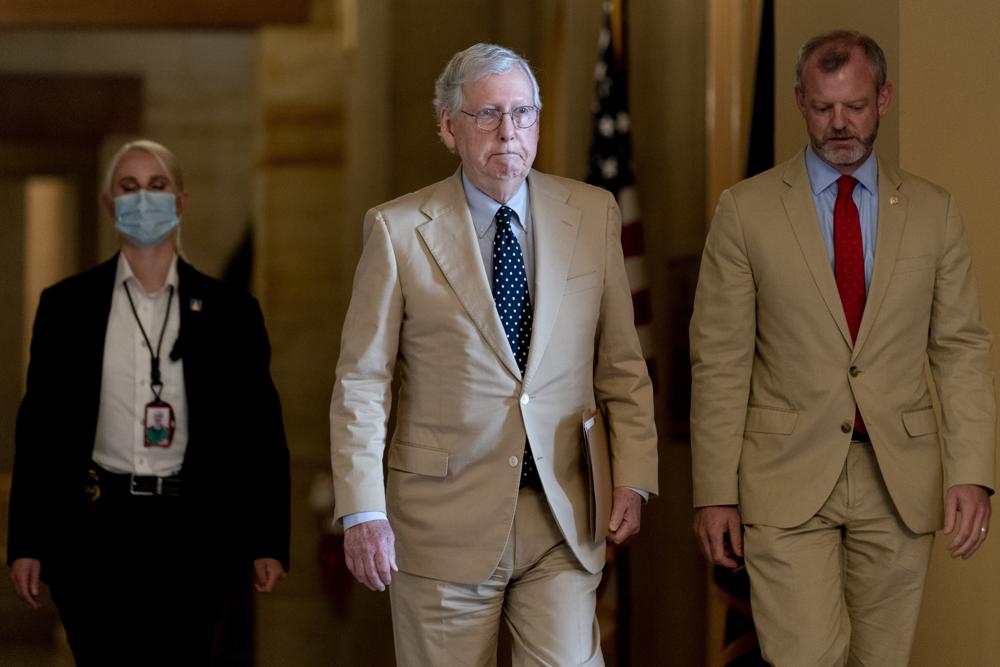
After weeks of fits, starts, and delays, the Senate is on track to give final approval to the $1 trillion bipartisan infrastructure plan, with a growing coalition of Democrats and Republicans prepared to lift the first phase of President Joe Biden’s rebuilding agenda to passage. Final Senate votes are expected Tuesday, and the bill would then go to the House. All told, some 70 senators appear poised to carry the bipartisan package to passage, a potentially robust tally of lawmakers eager to tap the billions in new spending for their states and to show voters back home they can deliver. Senate Majority Leader Chuck Schumer said it’s “the first time the Senate has come together around such a package in decades.” The often elusive political center is holding steady, a rare partnership with Biden’s White House. On the left, the Democrats have withstood the complaints of liberals who say the proposal falls short of what’s needed to provide a down payment on one of the president’s top priorities. From the right, the Republicans are largely ignoring the criticism from their most conservative and far-flung voices, including a barrage of name-calling from former President Donald Trump as he tries to derail the package. Together, a sizable number of business, farm, and labor groups back the package, which proposes nearly $550 billion in new spending on what are typically mainstays of federal spending — roads, bridges, broadband internet, water pipes, and other public works systems that cities and states often cannot afford on their own. “This has been a different sort of process,” said Sen. Rob Portman of Ohio, the lead Republican negotiator of the group of 10 senators who drafted the package. Portman, a former White House budget director for George W. Bush, said the investments being made have been talked about for years yet never seem to get done. He said, “We’ll be getting it right for the American people.” The top Democratic negotiator, Sen. Kyrsten Sinema, said she was trying to follow the example of fellow Arizonan John McCain to “reach bipartisan agreements that try to bring the country together.” Still, not all senators are on board, Despite the momentum, action ground to a halt over the weekend when Sen. Bill Hagerty, a Tennessee Republican allied with Trump, refused to speed up the process. Other Republican senators objected to the size, scope, and financing of the package, particularly concerned after the Congressional Budget Office said it would add $256 billion to deficits over the decade. Two Republicans, Sens. Jerry Moran of Kansas and Todd Young of Indiana, had been part of initial negotiations shaping the package but ultimately announced they could not support it. Rather than pressure lawmakers, Senate Republican leader Mitch McConnell of Kentucky has stayed behind the scenes for much of the bipartisan work. He has cast his own votes repeatedly to allow the bill to progress, calling the bill a compromise. Trump called Hagerty, who had been his ambassador to Japan, on Sunday, and the senator argued for taking more time for debate and amendments, in part because he wants to slow the march toward Biden’s second phase, a $3.5 trillion bill that Republicans fully oppose. The outline for the bigger $3.5 trillion package is on deck next in the Senate — a more liberal undertaking of child care, elder care, and other programs that is much more partisan and expected to draw only Democratic support. That debate is expected to extend into the fall. Unlike Biden’s bigger $3.5 trillion package, which would be paid for by higher tax rates for corporations and the wealthy, the bipartisan package is to be funded by repurposing other money and with other spending cuts and revenue streams. The bill’s backers argue that the budget office’s analysis was unable to take into account certain revenue streams — including from future economic growth. Senators have spent the past week processing nearly two dozen amendments to the 2,700-page package, but so far, none has substantially changed its framework. One remaining issue, over tax compliance for cryptocurrency brokers, appeared close to being resolved after senators announced they had worked with the Treasury Department to clarify the intent. But an effort to quickly adopt the cryptocurrency compromise was derailed by senators who wanted their own amendments, including one to add $50 billion for shipbuilding and other defense infrastructure. It’s unclear if any further amendments will be adopted. The House is expected to consider both Biden infrastructure packages when it returns from recess in September. House Speaker Nancy Pelosi has said the two bills will be considered together, but on Monday, a bipartisan group of centrist lawmakers urged her to bring their smaller plan forward quickly, raising concerns about the bigger bill, in a sign of the complicated politics ahead. “This once-in-a-century investment deserves its own consideration,” wrote Reps. Josh Gottheimer, D-N.J., Jared Golden, D-Maine, and others in a letter obtained by The Associated Press. “We cannot afford unnecessary delays.” Republished with the permission of the Associated Press.
Infrastructure bill fails first vote; Senate to try again

Senate Republicans rejected an effort Wednesday to begin debate on the big infrastructure deal that a bipartisan group of senators brokered with President Joe Biden, but pressure was mounting as supporters insisted they just needed more time before another vote, possibly next week. Senate Majority Leader Chuck Schumer, D-N.Y., had scheduled the procedural vote to nudge along negotiations that have dragged for weeks. But Republicans mounted a filibuster, saying the bipartisan group still had a few unresolved issues and needed to review the final details. They sought a delay until Monday. “We have made significant progress and are close to a final agreement,” the bipartisan group of senators, 11 Republicans and 11 Democrats said in a joint statement after the vote. The senators said they were optimistic they could finish up “in the coming days.” The nearly $1 trillion measure over five years includes about $579 billion in new spending on roads, broadband, and other public works projects — a first phase of Biden’s infrastructure agenda, to be followed by a much broader $3.5 trillion measure from Democrats next month. Biden’s top priority is at a critical juncture, posing a test of his ability to forge bipartisan cooperation in Washington and make investments the White House views as crucial to the nation’s ability to pull out of the COVID-19 crisis and spur economic growth. The president traveled to Ohio later Wednesday to promote his economic policies and was calling his infrastructure agenda a “blue-collar blueprint for building an American economy back.” He has said that Americans overwhelmingly support his plan. In a CNN town hall, Biden also talked up the benefits of the bipartisan framework, saying, “It’s a good thing, and I think we’re going to get it done.” He also made passing reference to the dangerously outdated Brent Spence Bridge across the Ohio River, saying they’ll “fix that damn bridge of yours.” At another point, Biden was asked by a union electrician if it was possible to bring Congress together to pass an infrastructure bill that would help the region replace the bridge. “The answer is, absolutely, positively, yes,” the president said. The party-line vote blocked the bill from advancing, 51-49, and fell far short of the 60 votes required under Senate rules. Schumer switched his vote to “no” at the end, a procedural step that would allow him to move to quickly reconsider. The bipartisan group has labored for days with Biden aides to strike a deal, which would be a first phase of the president’s eventual $4 trillion-plus package of domestic outlays — not just for roads and bridges, but foundations of everyday life, including child care, family tax breaks, education and an expansion of Medicare for seniors. The next steps are uncertain, but the bipartisan group insists it is close to a deal and expects to finish soon. “We’re voting no today because we’re not ready, but we’re saying we do want to take up this bill as soon as we are,” said Sen. Rob Portman, R-Ohio, a leader of the effort. “I think that’ll be Monday.” At least 11 Republicans signed on to a letter to Schumer saying they would vote yes to proceed on Monday if certain details about the package are ready. Republican Sen. Todd Young of Indiana was among the Republicans who signed the letter and said he was “cautiously optimistic” they can reach a bipartisan deal. Restless Democrats, who are facing a crowded calendar while trying to deliver on Biden’s priorities, nevertheless said they are willing to wait if a deal is within reach. “I’m willing to give it another chance next week,” said Sen. Richard Blumenthal, D-Conn. “But we need to fish or cut bait.” The senators in the bipartisan group were joined for a private lunch ahead of the vote by the two leaders of the House’s Problem Solvers Caucus, Rep. Josh Gottheimer, D-N.J., and Rep. Brian Fitzpatrick, R-Pa., a bipartisan group generally supportive of the effort. Schumer said senators are in the fourth week of negotiations after reaching an agreement on a broad framework for infrastructure spending with the White House. He said Wednesday’s vote was no different from other times when the Senate sought to get the ball rolling on debate and “not a deadline to have every final detail worked out.” But Senate Republican Leader Mitch McConnell of Kentucky encouraged Republicans to vote against it, called the vote a “stunt” that would fail, but he emphasized senators were “still negotiating in good faith across the aisle.” “Around here, we typically write the bills before we vote on them,” he said. Biden has been in touch with both Democrats and Republicans for several days, and White House press secretary Jen Psaki traveling with the president Wednesday on Air Force One said the administration was “encouraged.” While Biden proposes paying for his proposals with a tax hike on corporations and wealthy Americans who earn more than $400,000 a year, the bipartisan group has been working almost around the clock to figure out a compromise to pay for its package, having dashed ideas for boosting the federal gas tax or strengthening the IRS to go after tax scofflaws. Instead, senators in the bipartisan group are considering rolling back a Trump-era rule on pharmaceutical rebates that could bring in $170 billion, some of which could be used for infrastructure. They are also targeting unspent COVID-19 relief aid to health care providers and extending multiyear, modest reductions in a wide array of federal benefit programs, according to two people familiar with the talks who described the details on the condition of anonymity. Senators are also still haggling over public transit funds. Typically, spending from the federal Highway Trust Fund has followed the formula of 80% for highways and 20% for transit. Some Republicans are concerned that the ratio would change to 82%-18% under the bipartisan bill, said Sen. Mitt Romney, R-Utah. “Big numbers are involved,” Romney said. But Sen. Sherrod Brown, D-Ohio, said: “There’s not a lot of sentiment for public transit on their side. They
Joe Biden ends GOP infrastructure talks, starts new negotiations
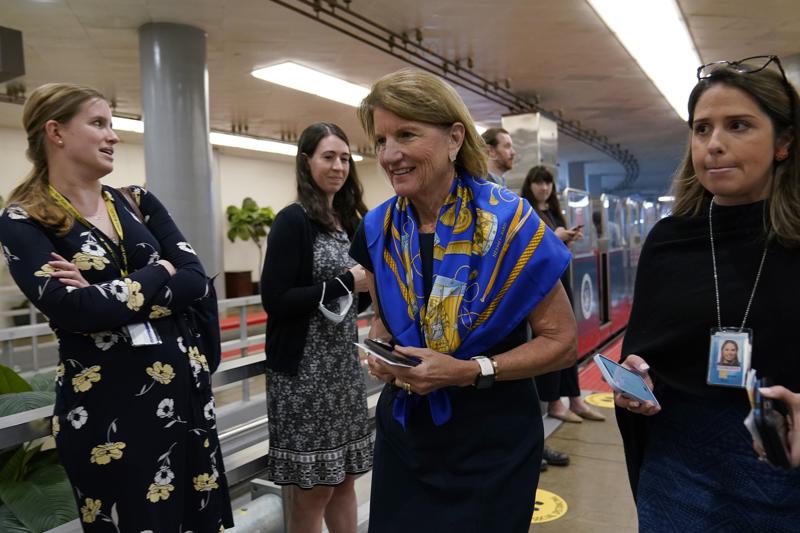
President Joe Biden ended talks with a group of Republican senators on a big infrastructure package on Tuesday and started reaching out to senators from both parties in a new effort toward bipartisan compromise, setting a summer deadline for Congress to pass his top legislative priority. The president is walking away from talks with lead Republican negotiator Sen. Shelley Moore Capito after the two spoke Tuesday, but would welcome her in the new bipartisan group, according to an administrative official who spoke on condition of anonymity to discuss the private negotiations. At the same time, with anxiety running high as time slips by, Democrats are laying the groundwork to pass some or all of the ambitious package on their own. Biden conferred Tuesday with House Speaker Nancy Pelosi and Senate Majority Leader Chuck Schumer about launching the budget resolution process for Senate votes in July, the White House said. “The President is committed to moving his economic legislation through Congress this summer, and is pursuing multiple paths to get this done,” White House press secretary Jen Psaki said in a statement. The breakdown comes after weeks of prolonged infrastructure talks between the president and Capito as the two sides failed to broker the divide over the scope of Biden’s sweeping infrastructure investment and how to pay for it. The Republican senators offered a $928 billion proposal, which included about $330 billion in new spending — but not as much as Biden’s $1.7 trillion investment proposal for rebuilding the nation’s roads, bridges, highways and other infrastructure, including Veterans Affairs hospitals and care centers. Biden has proposed raising the corporate tax rate from 21% to 28%, a nonstarter for Republicans, and rejected the GOP senators’ suggestion of tapping unspent COVID-19 aid money to fund the new infrastructure spending. In a statement, Capito said she was disappointed Biden ended the talks, but also expressed interest in ongoing bipartisan work. “While I appreciate President Biden’s willingness to devote so much time and effort to these negotiations, he ultimately chose not to accept the very robust and targeted infrastructure package, and instead, end our discussions,” she said. “However, this does not mean bipartisanship isn’t feasible.” As Biden aims for a compromise deal, he has begun reaching out to other senators, including Republican Sen. Bill Cassidy of Louisiana and two key centrist Democrats, Joe Manchin of West Virginia and Sen. Kyrsten Sinema of Arizona, whose votes will be crucial in the evenly split Senate. Those senators receiving phone calls from Biden are engaged in bipartisan talks, and a bipartisan group with Sen. Mitt Romney, R-Utah, was meeting later Tuesday at the Capitol to negotiate a fresh proposal. Psaki said the president urged the senators to continue their work “to develop a bipartisan proposal that he hopes will be more responsive to the country’s pressing infrastructure needs.” Biden tapped Cabinet and White House aides to meet with the senators in person. With the narrowly split House and the 50-50 Senate, the White House faces political challenges pushing its priorities through Congress with Democratic votes alone. Biden’s party holds a slight majority in the Senate because Vice President Kamala Harris can break a tie. The special budget rules could provide Biden with an alternative path, particularly in the Senate, because they allow legislation to be approved with a 51-vote threshold, rather than the 60 votes typically needed to advance a bill past a filibuster — in this case, led by Republicans against the Biden package. Democrats are watching warily as time passes and anxiety builds toward an agreement, with many lawmakers worried they are not fulfilling their campaign promises to voters who put the party in control of Congress and the White House. During a private discussion of Democratic senators at lunch Tuesday, there were differing views over whether they should keep talking with Republicans or pursue an approach that would allow them to pass a bill on their own, through the budget reconciliation process. Schumer told reporters afterward that Democrats are pursuing “a two-path approach.” The bipartisan talks led by Sinema with the other senators are underway, Schumer said, while the budget committee is preparing the legislation that would allow passage through the reconciliation process. “It may well be that part of the bill that is passed will be bipartisan, and part of it will be in reconciliation,” he said. “But we’re not going to sacrifice bigness and boldness.” The president is expected to engage with lawmakers while he sets out this week on his first foreign trip for an economic summit of the Group of Seven industrialized nations in Europe. Ahead of Biden’s announcement, the White House had also spoken to other lawmakers, including from the House. Rep. Josh Gottheimer, D-N.J., and Rep. Brian Fitzpatrick, R-Pa., the co-chairs of the bipartisan Problem Solvers Caucus, spoke late Monday with Brian Deese, director of the White House National Economic Council, about bipartisan efforts to reach an infrastructure deal, according to an aide who spoke on condition of anonymity to discuss the private conversations. Gottheimer is also working with Cassidy and Sinema from the senators’ group, the aide said. Republished with the permission of the Associated Press.
Democrats prep Joe Biden’s virus aid package with or without GOP
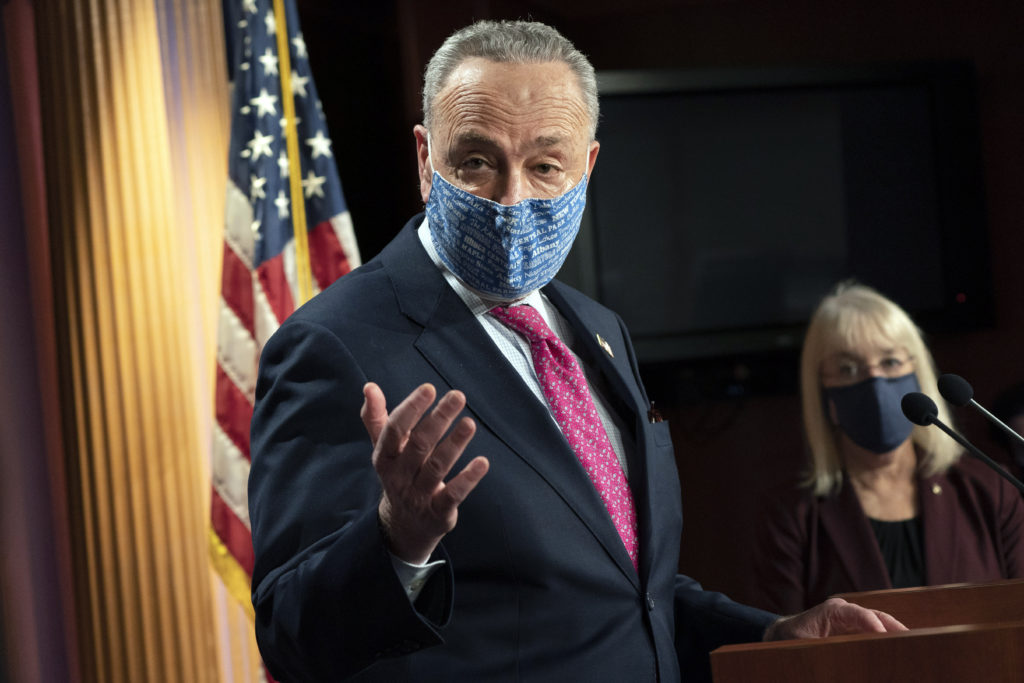
Senate Democrats are preparing to push ahead quickly on President Joe Biden’s $1.9 trillion COVID-19 relief package even if it means using procedural tools to pass the legislation on their own, leaving Republicans behind. Senate Majority Leader Chuck Schumer told senators to be ready to vote as soon as next week on a budget reconciliation package that would lay the groundwork for swift passage. Coming so soon in Biden’s administration, the action provides a first test of Republican opposition to the White House priorities as well as to the new president’s promise of a “unity” agenda. “The work must move forward, preferably with our Republican colleagues, but without them if we must,” Schumer said after a private meeting of Democratic senators. “Time is of the essence to address this crisis. We’re keeping all options open on the table.” Unwilling to wait for Republicans who argue Biden’s price tag is too high and his priorities too wide-ranging, Democrats are flexing their newfound power as they take control of the Senate alongside the House and White House. It is the first time in a decade the party has held the full sweep of power in Washington, and Democrats say they have no time to waste trying to broker compromises with Republicans that may, or may not, happen. They have watched Republicans use similar procedural tools to advance their priorities, most recently the Trump administration’s GOP tax cuts. The fast-moving events days into the new majority on Capitol Hill come as the White House continued meeting privately with groups of Republican and Democratic lawmakers in hopes of striking a bipartisan agreement. Biden’s COVID-19 aid package includes money for vaccine distribution, school reopenings, and $1,400 direct payments to households and gradually boosts the federal minimum wage to $15 an hour over five years. The next steps remain highly fluid. The bipartisan Problem Solvers Caucus of more than 50 House lawmakers had a “productive meeting and constructive conversation” Tuesday with top administration officials on the virus aid and economic recovery package, according to a statement from Rep. Josh Gottheimer, D-N.J., and Rep. Tom Reed, R-N.Y., who co-chair the group. A White House official, who spoke on condition of anonymity to discuss the virtual conversation with the caucus, said there was agreement on the scope of the challenges facing the country and the need for additional relief. Biden and other members of his team intend to continue making their case to lawmakers about the need to act with urgency. Separately, the dozen senators who emerged from a lengthy private meeting with the White House on Sunday evening are talking on their own about trying to craft a more targeted bill. The bipartisan group of senators assembled privately again Monday evening. White House press secretary Jen Psaki told reporters earlier Tuesday that Biden is still looking to negotiate on an aid package, while emphasizing that several components of the existing aid will lapse in March. “He laid out his big package, his big vision of what it should look like, and people are giving their feedback,” Psaki said. “He’s happy to have those discussions and fully expects it’s not going to look exactly the same on the other end.” Sen. Susan Collins, R-Maine, who led a bipartisan effort for the last $900 billion relief package, is working again with the senators on crafting an alternative package that she has said would be more focused on money for vaccine distribution and tailored economic assistance to the neediest Americans. Collins said Tuesday that the White House made good on its commitment to deliver a more detailed accounting of the proposed expenditure. But she said the group is still waiting for data on how much funding remains unallocated from past relief measures that, by her tally, totals a whopping $1.8 trillion still unspent. Congress has approved some $4 trillion in emergency aid since the start of the coronavirus pandemic last year, a stunning outlay and the largest rescue package in the nation’s history. Senators from both parties who joined the White House call over the weekend agreed the priority needs to be standing up the country’s faltering vaccine distribution system. With the death toll climbing, and new strains of the virus threatening more trouble ahead, ensuring vaccinations appears to be crucial to stemming the COVID-19 crisis. Several senators from both parties also said they want the $1,400 direct checks to be more targeted to those in need. They also want an accounting of what remains from previously approved aid bills. But Sen. Bernie Sanders, an independent from Vermont and the incoming Budget Committee chair, said he is already working on the budget package for next week and expanding it to include Biden’s proposal to raise the federal minimum wage to $15 an hour over five years. Raising the wage is a long-running Democratic priority that would essentially double the current $7.25 hourly wage set the last time the party was in control in the Obama administration. Advocates say the pay raise would boost millions of full-time workers from poverty. “There is a consensus,” Sanders told reporters at the Capitol. “If Republicans are not prepared to come on board, that’s fine. We’re not going to wait. We’re going forward soon and aggressively.” Republished with the permission of the Associated Press.
House Approves Measure to Restrain Trump’s Actions on Iran
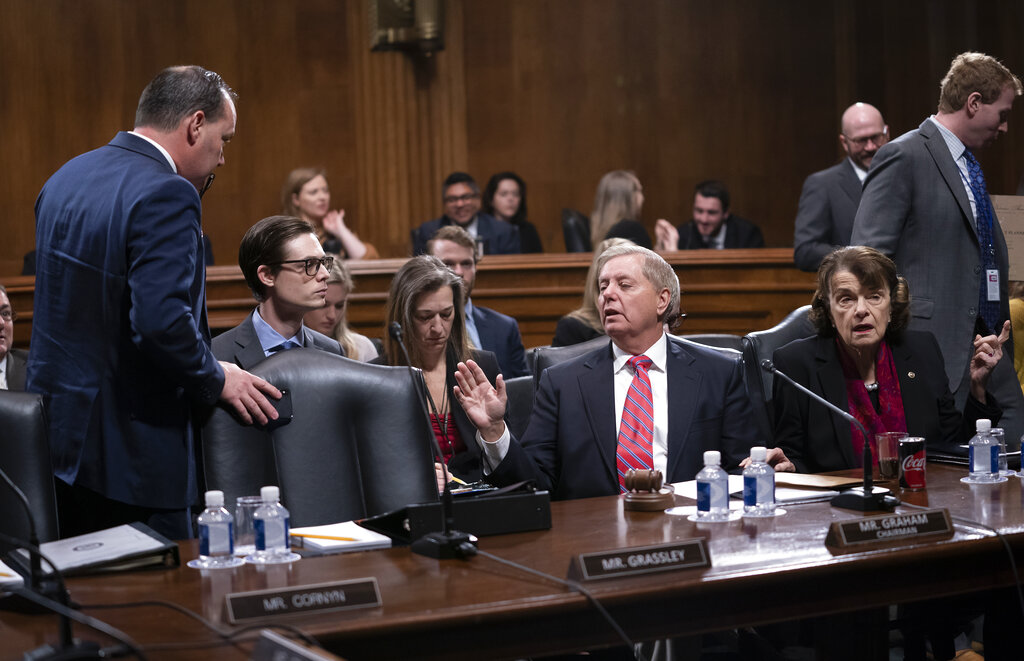
This resolution is not binding and is largely symbolic.

